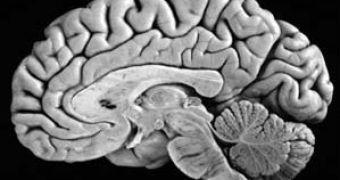Researchers at the University of Tennessee have recently made a model to explain how humans developed their large brains, starting from the "Machiavellian intelligence" hypothesis. "One of the two challenges in this research was to find a mathematical representation of verbal arguments underlying the Machiavellian intelligence hypothesis," explained Sergey Gavrilets, one of the researchers.
"Second, we had to perform a thorough numerical study of the mathematical model that we built, which required using a very large number of powerful computers. We found that the mathematical model strongly supports previous verbal arguments, which adds a lot of credibility to the latter."
The "Machiavellian intelligence" hypothesis says that social power and competition for better mates was driving human males to get abilities that rose cerebral capacity on an evolutionary timescale. (In this estimate females are neglected for simplicity.)
The hypothesis focuses primarily on the role of social factors on the evolution of brain size, but other possible factors, like climate and interspecies relationship surely acted an important role. Thus "intelligence" is "the ability to learn and use different ideas to the individual's own benefit."
Two parameters were chosen in describing intelligence: "learning ability"_ how easily a brain learns new strategies; and "cerebral capacity" _ the number of different ideas that a brain can store. These abilities are genetically determined, with the more socially intelligent males winning more mates and fathering more offspring, transmitting their intelligent genes to more individuals in the next generations.
Technological, linguistic, environmental and other abilities are seen as secondary benefits of a complex brain. The computer simulation, running through 30,000 generations of humans, from 350,000 to 35,000 years ago, identified three dynamic phases of intelligence evolution. In the "dormant phase," individuals increased their intelligence only by inventing an idea in their lifetime.
But large brains present an advantage only if they also have learned some ideas outside the dormant phase. "The dormant phase is when nothing much happens," said Gavrilets. "In a sense, this is a default state from which we start simulations." 5 to 20,000 generations later started the "cognitive explosion phase" when learning ability and cerebral capacity increased. During this time, both genetically determined traits expanded through the population, promoting rapid increase of the ideas.
The computer simulations showed that the cerebral capacity evolves more rapidly than the learning ability, so the storage capacity (potential) seems to be more important than ability. Even though complex ideas could bring more benefits to the population, individuals largely achieved simple ideas during this phase, ideas which are more beneficial for the individual himself. "[T]he complexity of memes [ideas] present in the population does not increase but, on the contrary, decreases in time".
"This happens as a result of intense competition among memes: whereas complex memes give advantage to individuals on a longer (biological) time scale, they lose competition to simpler memes on a shorter (social) time scale."
But, after a while, the more increasing brain gets very expensive, partly due to high-risk births as well as energy consumption. Human brain accounts for 2% of the body weight but with about 20% of a resting body's metabolism. Thus, there is a biological threshold of the brain increase, and after about 200,000 generations later, a "saturation phase" occurs. Throughout this time, there is a competition between simple and complex ideas, but natural selection clearly favors simple ideas because they spread easier.
To avoid birth risk, during this period brain growth is postponed in the juvenile age. As greater social intelligence favored the production of more offspring - in time - more intelligent humans evolved. In the modern civilization, it's fairly obvious that intelligence and reproductive fecundity don't generally correlate, as success is measured on the amount of material belongings, and a higher number of offspring impede the storage or keeping the goods. This change along with exposure to a large number of ideas produced a turning point in the evolution of the increasingly intelligent humans. "As the extent to which social success translates into reproductive success declines in modern societies, cognitive abilities are expected to be significantly reduced by natural selection," explained the scientists.
"Surprisingly, the competition for social/reproductive success was a very large driving force in the whole process. Personally, I didn't expect to find that the model would predict a reduction in intelligence." said Gavrilets.
This model may not describe a direct line to the evolution of Homo sapiens but combines several factors for explaining human brain size. The scientists are still puzzled why the large brain evolution occurred in humans, but not in other animals. "Some argue that the fact that humans managed to reach a state of 'ecological dominance' was crucial. Others will strongly disagree and will interpret the data differently." said Gavrilets.

 14 DAY TRIAL //
14 DAY TRIAL //